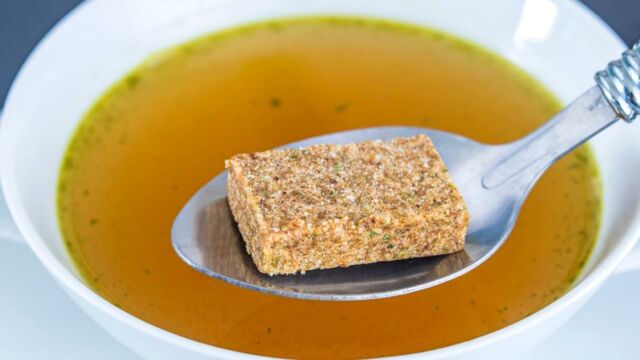Frequently used, stock cubes are a seasoning that, on the face of it, could be perfect for enhancing the taste of your dishes. However, their composition is sometimes worrying. Sold in supermarkets, they contain food additives such as glutamate. Also known as a 'synthetic flavour enhancer', it gives food a distinct salty taste and is linked to the so-called 'Chinese restaurant syndrome'.
Discover our latest podcast
Regular use of this product can cause headaches, nausea, chest tightness... In short, these are undesirable effects we could do without. In fact, the European Food Safety Authority (EFSA) strongly recommended, in a 2017 report, revising the amount of glutamates in certain foods, such as fine baked goods, soups and industrial sauces.
The hidden dangers of stock cubes
A real addiction for some consumers, the cubes also contain MOAH, potentially carcinogenic aromatic hydrocarbons from mineral oil. What's more, their palm oil content, with its disastrous environmental consequences, reinforces the idea that these broths may be more harmful than we think. Even organic stock cubes, although with a shorter, more comprehensible list of ingredients, should nevertheless be consumed in moderation.
In fact, the fat and sugar content is just as high as in conventional stock cubes. What's more, they're loaded with salt, particularly in veal stock, vegetable and poultry broths, and fish stock. This salt overload makes stock cubes a real enemy of weight loss and good health... So read every label carefully, even for 'organic' products. The French 60 Millions de Consommateurs association estimates that the amount of salt in these broth cubes varies between 0.43 and 1.63 g per 150 ml, which represents more than 25% of the recommended intake. Excessive consumption can therefore cause serious health problems.
Healthy alternatives to stock cubes
Don't panic, you don't have to eat bland, tasteless dishes for the rest of your life to preserve your health! Here are a few natural alternatives to stock cubes that will season your meals and add just as much flavour.
Use herbs, spices and other seasonings
A true pantry staple, spices, herbs and other seasoningsoffer a wide variety of choices that can be paired with many dishes and foods:
- Basil
- Thyme
- Rosemary
- Garlic
- Onions
- Paprika
- Laurel leaf
It's time to explore other recipes to avoid using industrial broths and other toxic ingredients in your recipes. You may even be surprised by the combination of certain seasonings or alliums. However, make sure you deep-clean your spice rack first!
Try this alternative recipe for a homemade broth
The ideal solution, however, is to make your own vegetable, poultry or beef stock. That's why we've put together a sample recipe for you to make at home, so you can easily get rid of those cubes and opt for healthier alternatives. And all the while preserving your health, without sacrificing the taste of your dishes.
Nothing could be simpler in the kitchen:
- Reserve vegetable scraps such as peelings, leaves or chicken and poultry carcasses
- Boil them over high heat
- Season to taste
For those with a sweet tooth, you can add fresh herbs for extra flavour. Once blended, strain the stock and store in the fridge (tip: use an ice cube tray to obtain a true cube shape). With this recipe, not only will you avoid harmful additives, but you'll also be helping to reduce food waste. A nice gesture for your health and for the planet.
This article has been translated from Oh!MyMag FR.
Read more:
⋙ These 5 'healthy' foods are actually harmful to your health
⋙ The top 3 most disappointing food items of 2023
⋙ You should be avoiding these popular food combinations, as per experts
Sources used:
European Food Safety Authority: Re‐evaluation of glutamic acid (E 620), sodium glutamate (E 621), potassium glutamate (E 622), calcium glutamate (E 623), ammonium glutamate (E 624) and magnesium glutamate (E 625) as food additives
Foodwatch: Dérivés d’hydrocarbures toxiques dans des bouillons cubes Knorr : foodwatch remporte une manche mais la partie se poursuit à Bruxelles















